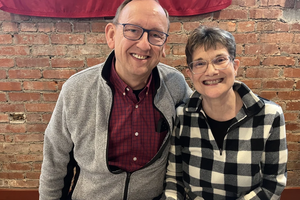Hundreds Gather for First-Ever Deaf Eucharistic Congress
According to Father Depcik, surveys have found that 96% of Deaf people do not attend church as there are limited services available in American Sign Language (ASL).

Deaf Catholics from across the United States gathered in Maryland for a Eucharistic congress of their own — the first of its kind.
Held at the National Shrine of St. Elizabeth Ann Seton in Emmitsburg, Maryland, April 4–6, the congress brought together more than 200 Catholics to pray and honor the Eucharist.
Inspired by the National Eucharistic Congress last summer in Indianapolis, the Deaf Catholic congress was centered on the Eucharist and featured opportunities for attendees to go to confession with signing priests.
There are fewer than 10 Deaf priests serving the entire Deaf Catholic population in the U.S. The Deaf community often distinguishes between being “culturally Deaf” (signified by the uppercase Deaf) versus losing hearing later in life.
Father Mike Depcik — one of those few priests — designed the congress to be entirely focused on the Deaf Catholic community. The event featured Deaf presenters as well as adoration, Mass, confession, and fellowship — all in sign language.
According to Father Depcik, surveys have found that 96% of Deaf people do not attend church as there are limited services available in American Sign Language (ASL).
Sister Kathleen Monica Schipani, an organizer of the Deaf Eucharistic Congress, said the congress was designed “to attract more of the Deaf community throughout the United States.”
Sister Kathleen — a sister servant of the Immaculate Heart of Mary who serves as director of the Office of Persons with Disabilities and Deaf Apostolate for the Archdiocese of Philadelphia — highlighted the importance of shared language.
“We as Catholics love to communicate with each other and be inspired by the faith of another person who speaks your language, whether it’s English or Spanish,” Sister Kathleen told EWTN’s associate producer for EWTN News Nightly Julia Convery.
“The Deaf community are the same way — they want to interact not only with the person presenting but with one another, and [to] pray together in the language that they love and cherish.”
The National Shrine of St. Elizabeth Ann Seton has been a place of gathering for Deaf Catholics before. The Seton Shrine frequently hosts retreats, including a Lenten retreat for the Deaf last year. The Seton Shrine is located just a half hour away from the K–8 Maryland School for the Deaf.
Father Sean Loomis, a chaplain of the Deaf Apostolate for the Archdiocese of Philadelphia who is fluent in American Sign Language, said the event was “incarnational.”
“Because ASL allows the Deaf community to command more of their body and to employ it in the interaction with other people, the theology of the Incarnation becomes explosive,” Father Loomis told EWTN. “And so when they are, for example, deep diving into the Gospels, the whole Gospel becomes alive. It’s not English vocabulary just changed into a certain sign to match it — it’s a movie that’s transpiring in front of you.”
Jeannine Adkins, a Deaf Catholic from Topeka, Kansas, who gave a presentation at the event on the healing power of the Eucharist, explained how the Deaf community is like a family.
“When we’re together, we have a common bond and we can help each other, and we want to bring people to Jesus,” Adkins told EWTN. “Because we’re Deaf, we feel like family together.”
As part of her digital ministry platform DeafCatholicMom, Adkins shares her own faith and even translates various Catholic resources into sign language to share on platforms like YouTube.
“I wanted to tell people about my love for Jesus and that in the Eucharist, Jesus’ soul and divinity is truly there,” Adkins said. “I wanted to express that and different ways that we can inspire people to go back to church, to go back to serve within the Church and that use their gifts within the Church.”
Organizers hope the event will become an annual one, growing as the word spreads.
“We’re here to worship Jesus in the Eucharist and really understand that we’re the body of Christ. People who have disabilities or who are Deaf are overlooked in that body and access isn’t provided,” Sister Kathleen said. “So when it is really provided, I think we’re a fuller expression of the body of Christ, and I think Jesus is really pleased.”
- Keywords:
- eucharistic congress


















